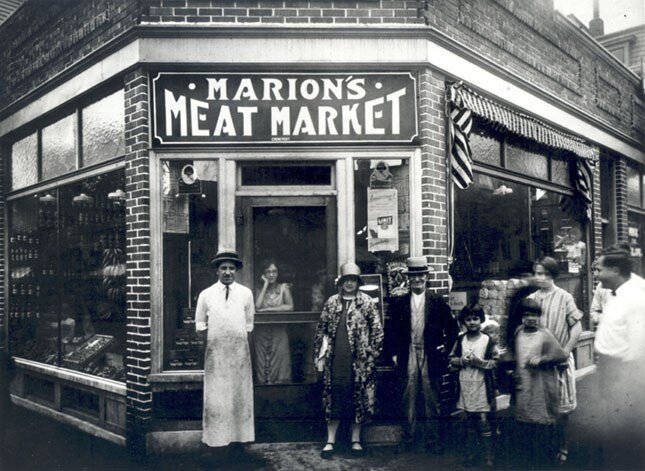Marion’s Meat Market, Little Canada neighborhood, Lowell, Mass., c. 1925. Wilfrid Marion, owner, at left in long apron.
Why Do I Tell the Franco-American Story?
By Paul Marion
For Jesse Martineau, co-host, The French-Canadian Legacy Podcast, which is based in New Hampshire.
I believe it is important to know your roots. I believe that you have a better chance to know who you are if you know where you come from, if you know how you got to where you are today. Why is it important to know who you are? I believe you will lead a more fulfilling life if you have a sense of how you fit in the larger flow of humanity. It’s about what I call coherence, which I take to mean having a unified sense of being, a feeling of being whole in body and soul and mind. It’s the opposite of being alienated, the feeling of being disconnected from society. Knowing who you are and knowing something about where you are gives a person a better chance of feeling a sense of community, a sense of belonging to something larger than your individual self.
Who am I? has the simplicity of the old Baltimore Catechism question: Who made me? In Catholic elementary school a lot of answers were provided. Just memorize what’s in the book. Just listen to the priest at Mass. Just do what Sister Thérèse de L’Enfant de Jesus says. They offered a lot of answers after providing the questions as well. But in all those school days in a French Catholic school, I don’t recall any of the authorities telling us how the French Canadians wound up in Dracut, Mass. There was no local history in school. They customs, yes, like singing the Canadian national anthem in French, and the flag of Quebec in the classroom next to the red, white, and blue U.S. flag. Sometimes the Mass was in French. Early on it was in Latin in my day. Then it was English with the priest facing the faithful in the pews. “Pray, pay, and obey,” was the unspoken game plan. We had a few “French” items in the school cafeteria like Chinese Pie or Pâté Chinois, the regional concoction that is a twist on Shepherd’s Pie from Ireland and Britain. Until the canonical law changed, we were not served any meat on Fridays. Gooey mac-and-burnt stinky cheese, tomato-rice soup, fish sticks. We had French language day on Thursdays and French courses, and grammar and conversation all the time. At home my parents spoke French to my grandparents and their brothers and sisters (not all the time). We visited relatives on New Year’s Day, which is special for the French-Canadian Americans. The older generations told stories about the immigrants and subsequent generations. My ancestors on both sides came to Lowell, Mass., in 1880. Despite all this, my generation turned out to be highly homogenized American in identity.
As someone interested in history, I always had a sense of my past and was curious but not in any extraordinary way. I had lost my ability to speak French fluently, even semi-fluently, after high school or likely before public high school. One of my brothers attended a French Catholic high school, but I chose not to. As the years went on, I began to think more about my family’s origins. When my son was born in 1995, the sixth generation of our line in Lowell, he came to my wife and me with her 100 percent Irish roots stretching back to 1870 in the city and my 100 percent French background. I realized that he would be far from his ethnic origins. It would be up to me to give him some grounding so that he would understand in part where he comes from. His arrival heightened my commitment to tell the French-Canadian American story in my writing, both the Lowell French story and my family’s place in it. I’m still reconstructing the family experience. Fortunately, two of my aunts had researched the genealogy of the Marion and Roy lines as far back as the mid-1600s in Normandy, France. The paper trail doesn’t go back farther, so far.
And so, as a writer, I have a way to tell the story of my family, my community, my people. The knowledge has added texture to my experience. Embracing the identity has opened up connections to other people in New England, in Quebec, around the U.S., and abroad. I’m part of a larger effort to remember. There’s a transcript of an interview with a French-Canadian American woman from Lowell from the 1980s. In it, she talks about the Lowell French in her time, early 20th century, and she sings songs. The lyrics are reproduced. Speaking to the interviewer, she says at one point, “I’m a memory worker.” That captures what’s going on in this telling of the French story in America. Those of us who write, speak, sing, research, and more are all memory workers in the big Memory Bank.
(Presently, there are two million French-Canadian Americans living in New England, descendants of the hundreds of thousands of Québec residents who migrated south in the late 19th and early 20th centuries in search of better living conditions.)
—PM, March 25, 2020
